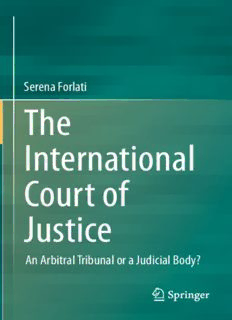
The International Court of Justice: An Arbitral Tribunal or a Judicial Body? PDF
Preview The International Court of Justice: An Arbitral Tribunal or a Judicial Body?
Serena Forlati The International Court of Justice An Arbitral Tribunal or a Judicial Body? The International Court of Justice ThiSisaFMBlankPage Serena Forlati The International Court of Justice An Arbitral Tribunal or a Judicial Body? SerenaForlati DepartmentofLaw UniversityofFerrara Ferrara,Italy ISBN978-3-319-06178-8 ISBN978-3-319-06179-5(eBook) DOI10.1007/978-3-319-06179-5 SpringerChamHeidelbergNewYorkDordrechtLondon LibraryofCongressControlNumber:2014942022 ©SpringerInternationalPublishingSwitzerland2014 Thisworkissubjecttocopyright.AllrightsarereservedbythePublisher,whetherthewholeorpart of the material is concerned, specifically the rights of translation, reprinting, reuse of illustrations, recitation,broadcasting,reproductiononmicrofilmsorinanyotherphysicalway,andtransmissionor informationstorageandretrieval,electronicadaptation,computersoftware,orbysimilarordissimilar methodologynowknownorhereafterdeveloped.Exemptedfromthislegalreservationarebriefexcerpts inconnectionwithreviewsorscholarlyanalysisormaterialsuppliedspecificallyforthepurposeofbeing enteredandexecutedonacomputersystem,forexclusiveusebythepurchaserofthework.Duplication ofthispublicationorpartsthereofispermittedonlyundertheprovisionsoftheCopyrightLawofthe Publisher’s location, in its current version, and permission for use must always be obtained from Springer.PermissionsforusemaybeobtainedthroughRightsLinkattheCopyrightClearanceCenter. ViolationsareliabletoprosecutionundertherespectiveCopyrightLaw. The use of general descriptive names, registered names, trademarks, service marks, etc. in this publicationdoesnotimply,evenintheabsenceofaspecificstatement,thatsuchnamesareexempt fromtherelevantprotectivelawsandregulationsandthereforefreeforgeneraluse. While the advice and information in this book are believed to be true and accurate at the date of publication,neithertheauthorsnortheeditorsnorthepublishercanacceptanylegalresponsibilityfor anyerrorsoromissionsthatmaybemade.Thepublishermakesnowarranty,expressorimplied,with respecttothematerialcontainedherein. Printedonacid-freepaper SpringerispartofSpringerScience+BusinessMedia(www.springer.com) To Raffaele ThiSisaFMBlankPage Preface The International Court of Justice is the principal judicial organ of the United Nations,andepitomisestheverynotionofinternationaljudicialinstitution.Yet,the consensualbasisofitscontentiousjurisdictionmakesitmoresimilartoanarbitral tribunalthananyotherinternationalcourt.Theaimofthisbookistoassessif,and how,theproperlyjudicialfeaturesoftheCourt—itspermanentcharacter,thepublic natureofitsproceedings,thenon-derogablenatureofitsStatute,thepossibilityfor thirdStatestointerveneinproceedings—anditsorganiclinktotheUnitedNations haveledittodepartfromprinciplesestablishedininternationalarbitrationandif,in thelightofthis,itsroleinthesettlementofinter-Statedisputescanbedistinguished fromthatoftraditional,non-institutionalisedarbitraltribunals.Thisissueisbyno means new: it was debated at length when the Permanent Court of International Justicewasestablished,andagainwhentheInternationalCourtofJusticereplaced it.However,areappraisalseemswarrantedasthecentennialoftheadoptionofthe StatuteofthePermanentCourtofInternationalJusticeapproaches.Theframework inwhichtheInternational CourtofJusticeisnowoperatingisverydifferentfrom thatwhichexistedwhenthePermanentCourtbeganitsactivitiesinthe1920s.The growing readiness of States to submit to adjudication disputes involving other Statesornon-Stateactorsandtheensuingproliferationofinstitutionalisedinterna- tional tribunals seem to have influenced the Court’s reading of its own role— although possibly not to the full extent allowed for by the letter of the Statute. Moreover, in its recent practice the Court has taken a number of steps aimed at fosteringinternationalpeaceandsecuritythatmarkitsdistancefrominternational arbitration.Whetherthesedevelopmentsarealldesirableperse,andwhetherthey are sufficient to distinguish the contentious jurisdiction of the Court from the arbitral model—as was the intention of the drafters of the Permanent Court’s Statute—is open to question. Hopefully, this work will provide some useful elementsforthisdiscussion. I am grateful to Professor (now Judge) Giorgio Gaja, for his many insightful commentsovertheyears,includingthoseonanearlierdraftofthisbook.Iamalso indebtedtoProfessorFrancescoSalerno,foralwaysfindingthetimetodiscussmy vii viii Preface work and for the support he has given me in many other ways. All remaining shortcomingsare,ofcourse,onlymine. The book is updated as of 31 December 2013. Unreported judgments and documentsoftheICJareavailableontheCourt’swebsite,www.icj-cij.org. Ferrara,Italy SerenaForlati January2014 Abbreviations Annfrdrint Annuairefranc¸aisdedroitinternational AmJIntLaw AmericanJournalofInternationalLaw AmSocIntLaw AmericanSocietyofInternationalLaw BIICL BritishInstituteofInternationalandComparativeLaw BrYearBIntLaw BritishYearBookofInternationalLaw CACJ CentralAmericanCourtofJustice CollectedCourses HagueAcademyofInternationalLaw,CollectedCourses CTS ConsolidatedTreatySeries ECHR EuropeanConventiononHumanRights ECJ EuropeanCourtofJustice ECR EuropeanCourtReports ECtHR EuropeanCourtofHumanRights EurJIntLaw EuropeanJournalofInternationalLaw HumRightsLawRev HumanRightsLawReview IACtHR Inter-AmericanCourtofHumanRights ICJ InternationalCourtofJustice ICSID InternationalCentreforSettlementofInvestment Disputes ILA InternationalLawAssociation ILC InternationalLawCommission ILCModelRules InternationalLawCommission,ModelRulesonArbitral Procedure ILO InternationalLabourOrganization ILR InternationalLawReports IntCompLawQ InternationalandComparativeLawQuarterly Inter-StateOptional PermanentCourtofArbitration,OptionalRulesfor Rules ArbitratingDisputesBetweenTwoStates IOSOptionalRules PermanentCourtofArbitration,OptionalRulesfor ArbitrationInvolvingInternationalOrganizationsand States ITLOS InternationalTribunalfortheLawoftheSea ix
Description: